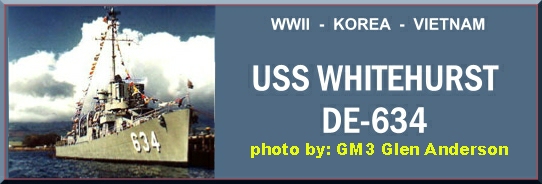
USS Whitehurst Logo by: Pat Stephens, Webmaster, DESA
|
A. J. Wichita, Merchant Marine Veteran and |
|
|
Engineering Officer USS Whitehurst |
|
|
|
1954, Whitehurst Eng. Off. |
|
This story taken from Maritime, the official publication of The American Merchant Marine Veterans Produced by the SS Stephen Hopkins Chapter... max crow |
|
|
My interest in the sea started with sea stories I read while hiding from
the nuns A trainload of farm boys and I were shipped to Sheepshead Bay in Brooklyn, New York. The Coast Guard trained me to be a Fireman/Watertender. My first ship was a Liberty just returned from Murmansk. Survival rate on a Murmansk trip was not good, and men would troll the bars offering seamen $1000 to sign over their insurance policy. A British Admiralty study showed for the years 1939-1945, 12,090 Allied ships of all size tonnage were lost to enemy attack. In the eight years as a Merchant Mariner, none of my ships experienced a
fire fight or
a torpedo. The sea, nevertheless, provided its own potential for getting
hurt or losing
your life. While at anchor in Gibraltar our ship was dragging anchor in a
storm; and we
tangled with a British vessel. Our ship banged into her #4 hold hard
enough to rip a
gaping hole in the side. The American and British seamen on deck were
shouting at each
other. I remember the Brits shouting, "Hit her again you bloody Yanks!"
The British
seaman could not stick mattresses in the gap fast enough to slow the water down.
The In the Oran harbor the ship ran aground dodging other sunken ships, but was able to pull off within a few hours. We went on to Livorno, Italy. Later we received word that Mussolini was caught and hung, upside down, with his mistress. The people in Italy were so hungry they were in our garbage cans looking for food. The Captain ordered all food not needed for the trip back be left for the Italians. The SS Biddeford Victory was headed for Buenos Aires so I signed on early in 1947. Before we left New York, the third Engineer was killed in an electrical accident. Two years later on SS Stanvac Palembang, as the ship maneuvered in the estuary of an Indonesian river, I was blown across the engine room by an electrical explosion. After bandaging, I was allowed to keep a bottle of the Captain's brandy--a sure fire pain killer. My eyes were scorched and I could not see for a couple of days. In 1950 our Stanvac ship was turned over to Italy. We were given three months vacation by the company, so the second officer and I decided to tour Italy by train. We had an opportunity to see the Pope in person. While in Rome I read an English Language newspaper announcing that North Korea had invaded South Korea. To me this was the beginning of WWIII. In time my name came to the attention of the draft board. They thought I should be in the Army. Fortunately the Navy was willing to give me a commission. The day it arrived, I married Mary Lib Stavinoha from Temple, Texas, which was the start of a 50 year romance. For the remainder of the Korean War, I was Engineering Officer aboard the USS Whitehurst. During a layover in Guam, I went before the Coast Guard board to take a Chief Engineer's exam for merchant vessels. I thought that with this last endorsement, I would be able to land a good shore-side job after my Navy discharge. Not so. In 1955 I found jobs scarce. My first job was selling vacuum cleaners. I later moved up a little and set up distributorships in Hollywood selling paper bikinis. My new bride encouraged me to find work closer to my background. Finally, Carrier Corporation found my resume satisfactory and gave me a job developing planned maintenance programs for customers in the south-west. Having long aspired to have my own company, I bought into the Krackett Company producing snack chips for the food industry. President Kennedy's assassination created a temporary financial crisis in the country, and I moved into the production of water repellent coatings. I also produced and dis-tributed a line of soap products called King's X and Maid-Brite. In 1976 I founded Hi-Tech Oil Blends, which I still operate. |
|
|
|
|
|
A. J. Wichita in 2005 |
|
WWII
Era | Korea War &
'50s | Viet Nam & 60s |
Reunions |
All Links Page
Search & Rescue
Memorial | Poetry | Enemy Below | Taps List | Photos/Armament | History | Crews Index | Home


